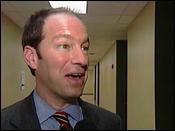Meeting Roskam about the war
On Monday, March 19, a group of other citizens seeking to bring our troops home from Iraq met with U.S. Congressman Peter Roskam (Rep., IL Dist. 6) at his office in Bloomingdale. Here is there report:
A bricklayer and foster father, a former math teacher, a children's novelty-candy salesman, a retiree from COD and peace activist, friends of a mother who had lost her son to an IED just six weeks ago and a grandfather who still lives with the pain of a grandson lost two years ago in this ongoing war. We all came looking for answers from Peter Roskam; for some vision of how he plans to bring an end to a war, now opposed by 63% of Americans, started on false pretenses and continuing behind a shield of upholding troop morale.
In short, Peter Roskam doesn't have a plan to bring an end to the war in Iraq and is the very embodiment of the President's "be patient and stay the course" non-plan. He feels, he told us, that his slight margin of victory in November was a mandate for his campaign promise to "finish well" in Iraq. When asked by several members of our group what that might look like, he could not articulate anything specific. When asked whether he thought he would tolerate two more years of the heightened violence and destruction (please see http://www.americanprogress.org/ Iraq by the numbers for all the figures) or five more or ten he responded that he would not be "cross-examined". Sort of ironic coming from a former personal injury attorney and public servant.
Please be assured that Mr. Roskam was extremely polite and a good listener. His staff was welcoming and we were seen promptly at 9:30 as was promised. Of course, this should be the norm when having a meeting with one's employers but, as anyone who has ever tried to meet with Henry Hyde will tell you, it can often feel as if the constituent serves at the pleasure of the congressperson and not the other way around.
We weren't surprised to learn that Mr. Roskam believes that there are droves of Islamic fundamentalist terrorists who, without provocation, are planning our demise everyday (please go to www.gpoaccess.gov/crecord to see the text of his floor remarks on Feb 16th) and that most of them are now in Baghdad. He believes Mr. Bush's homeland security policies have kept us safe from further attacks (nevermind that passport services overflow calls are being handled by volunteers...a digression but not really). He believes that if we don't keep these terrorists in the playpen we call Iraq, they will wander over here (probably across the Mexican border with all of those social-security stealing "illegals" he campaigned about).
Mr Roskam whose favorite phrase is "let's unpack that" when he wants to debunk something he feels has been been properly thought through, did not have any interest in "unpacking" his own things. He did not want to unpack the reason why we chose to attack Iraq when Afghanistan and Saudi Arabia provided the villains of 9/11. He did not want to unpack his rationale for why he voted for the surge of troops even after assuring Kevin Landeck's grieving father that he was the guy who would offer his ear and make a difference. Rich Landeck told Peter personally that Kevin repeatedly said that the war was being run incompetently and that they could not militarily solve the problems he saw in Iraq. When asked several times whether he would be willing to pack up his own child's things to go to this war, Mr Roskam avoided an answer.
Toward the end of our meeting, Roskam shared an analogy he gives when talking to our grade school children. The U.S., he posits, is like a person standing at the side of the pool and the Iraqis are like a person drowning. The U. S. is reaching out its hand to the Iraqis but unless they reach back, the U.S. can't pull them out. What he neglects to tell them is that it was the U.S. who pushed them in in the first place and then proceeded to hold their heads under water for four years now. Makes you wonder how long it will take him to unpack that. In 2008, District 6 needs to do more than cross-examine Peter Roskam, they need to vote him out.



